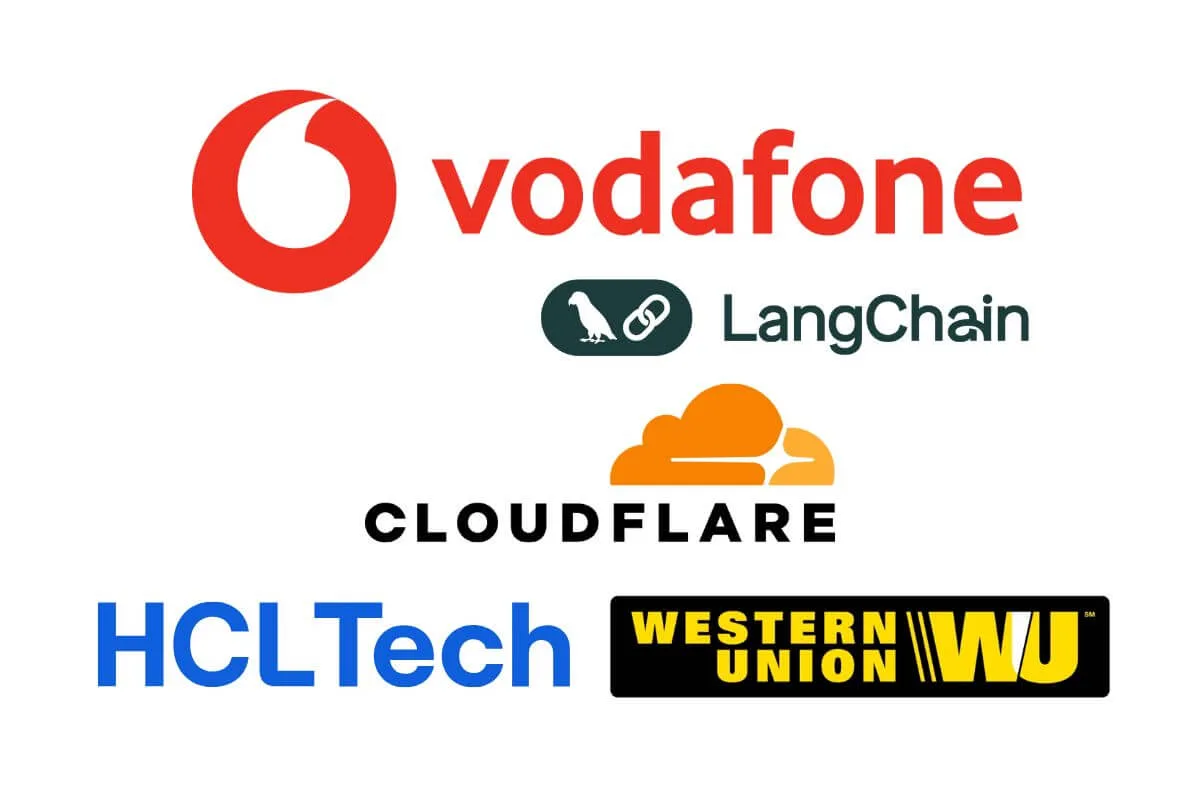
Tech giants are leveraging AI to drive innovation across industries. Vodafone is enhancing data operations with AI-powered assistants, improving efficiency in data centers. Cloudflare has introduced AI Labyrinth, a new defense mechanism against AI scrapers, misleading bots with decoy content. Meanwhile, HCLTech and Western Union have partnered to accelerate digital transformation in financial services through AI-driven solutions.
Also Read: Wipro Sovereign AI, Capgemini Agentic AI, TCS Air New Zealand Partnership, Tech Mahindra PV Solution
1. Vodafone Leverages AI to Enhance Data Operations with LangChain and LangGraph
UK-based telecommunications company Vodafone is advancing its data operations by deploying AI-powered assistants to support engineering teams across its data centers. By leveraging LangChain and LangGraph, Vodafone has streamlined real-time performance analysis, infrastructure management, and operational efficiency for its network of data centers in Europe.
To enhance data operations, Vodafone has built several AI assistants using LangChain and LangGraph that facilitate intelligent data access, natural language-driven insights, and complex problem-solving, according to the blog post. LangChain is an open-source framework for building applications based on large language models (LLMs).
AI-Powered Assistants for Engineers
Vodafone has developed two AI-powered internal chatbots—Insight Engine and Enigma—deployed on Google Cloud to support engineering teams working in multiple operations across its data centers.
- Insight Engine: Transforms natural language queries into SQL, providing real-time performance metrics and dynamic insights without requiring custom dashboards. "This assistant analyses performance metrics by converting natural language queries into SQL to retrieve key data from data centers monitoring systems."
- Enigma: Enables engineers to quickly retrieve technical documentation and internal resources from MS-SharePoint, significantly reducing search time.
This assistant enables efficient access to thousands of technical documents and resources. Engineers can ask questions to verify specific designs, retrieve inventory details, or identify contacts within the organisation— reducing time spent sifting through documentation.
These AI-driven agents have enhanced incident diagnosis and response times by dynamically generating insights, reducing engineers' reliance on manual queries.
Scaling AI with LangChain and LangGraph
Vodafone adopted LangChain to build Retrieval-Augmented Generation (RAG) pipelines, allowing engineers to process and retrieve insights from diverse technical documents. This framework enabled rapid prototyping and benchmarking across multiple large language models (LLMs), including OpenAI's models, LLaMA 3, and Google Gemini.
As Vodafone expanded its AI capabilities, LangGraph was introduced to implement a multi-agent architecture that enhances coordination between AI agents. This has allowed Vodafone to:
Develop modular AI agents with specialised functions, such as data collection, processing, and visualisation.
Integrate APIs seamlessly for dynamic orchestration within Vodafone’s data ecosystem.
Ensure reliability through workflow validation, improving accuracy and efficiency.
Future Plans with LangSmith
Looking ahead, Vodafone plans to integrate LangSmith to enhance debugging, evaluation, and performance tracking of AI applications. This will further improve collaboration between developers and engineers, ensuring AI solutions remain robust and aligned with operational needs.
AI in Telecommunications
With LangChain, LangGraph, and LangSmith, Vodafone has reportedly reduced time-to-insight, improved scalability, and future-proofed its AI-driven systems. The company aims to extend its GenAI pipeline to additional data sources, build even more sophisticated multi-agent systems, and refine its benchmarking processes for a wider range of AI applications, according to a blog post on LangChain website.
Also Read: AI: Google Health AI Updates, xAI Acquires GenAI Video Startup, Mistral Releases Small AI Model
2. Cloudflare Launches AI Labyrinth to Trap and Confuse AI Scrapers
Cloudflare said it launched AI Labyrinth, a new mitigation service for web hosting customers designed to prevent AI crawler bots from scraping data from websites. The new service combats unauthorised AI crawlers by misleading them with AI-generated content. Instead of simply blocking bots—alerting them to adapt—AI Labyrinth traps them in an endless maze of decoy pages, wasting their time and resources.
A Smarter Defense Against AI Scrapers
The service comes as AI companies increasingly use new crawlers to scrape data for model training. Cloudflare estimates that more than 50 billion daily requests to its servers come from AI crawlers, accounting for 1 percent of total web requests.
Traditional blocking methods trigger an arms race with evolving crawlers. AI Labyrinth, however, confuses rather than confronts, redirecting bots into a web of convincing but irrelevant AI-generated pages.
This system also serves as a next-generation honeypot, identifying bots with high confidence. Since human users won't see or engage with these hidden links, any entity that does is flagged, feeding valuable data into Cloudflare's bot detection models.
The AI Labyrinth service is available on an opt-in basis to all customers, including those on the Free plan.
Also Read: Oracle UK Investment, ServiceNow AI Agents, Google AI Chip, Tech Mahindra–Google Cloud Partnership
3. HCLTech and Western Union Partner to Transform Financial Services with AI
IT services company HCLTech and Western Union have announced a strategic partnership aimed at accelerating innovation and digital transformation in the financial services sector. This collaboration positions HCLTech as Western Union's preferred partner, leveraging AI, cloud, and digital solutions to enhance operational agility and customer experience.
As part of the agreement, Western Union will adopt HCLTech's AI-powered platforms, FENIX 2.0 and AI Force, to transition to a platform-centric operating model. This move is expected to improve scalability, efficiency, and resilience. HCLTech will also support Western Union’s enterprise-wide infrastructure transformation, enabling data-driven decision-making and increased digital capabilities.
Expand Footprint in India
Western Union, in collaboration with HCLTech, will also establish an advanced technology center in Hyderabad, India. This will further enhance Western Union's global technology capabilities and create new opportunities for innovation and talent development, the companies said in a joint statement on Monday, March 24.
Western Union CEO Devin McGranahan highlighted the collaboration as a step towards making world-class financial services more accessible.
C Vijayakumar, CEO and Managing Director of HCLTech, added, "This strategic partnership emphasises our focus on empowering fintech companies through digital engineering-led transformation and creating exceptional value for their stakeholders."















